There are plenty of exciting places in Portugal to set up a new home, but you’ll never be disappointed when you decide on living in Lisbon. Known for its rich history and vibrant culture, Portugal’s capital uniquely blends relaxed and energetic vibes while being one of the safest cities in Europe for expats and young families.
In this article, we’ll explore what makes Lisboa a great destination, from its affordable cost of living and navigating the public transport system to the best places to meet “Lisboetas” for making new friends and getting some local tips.
You’ll also find out more about:
Lisbon Quick Facts
Lisbon, Portugal’s capital and largest city, is located on the western coast of the Iberian Peninsula in southern Europe and is the westernmost European capital on the mainland. It is listed as one of the most affordable compared to most European cities, making it a go-to destination for Americans moving to Portugal.
Lisbon Quick Facts | |
Population | 517,802 |
Climate | Mild winters, hot summers |
Nearest Airport | Lisbon Humberto Delgado Airport |
Beach Proximity | ~20 mins (Cascais, Estoril, Costa Caparica) |
Ideal for | Professionals seeking career opportunities and digital nomads. |
International schools | Approximately 30 in Lisbon and the surrounding metropolitan area. |
Why is everyone moving to Lisbon?
Lisbon is an excellent choice for anyone, and it’s easy to see why:
Flexible immigration policies: Portugal offers a seamless visa application process with flexible immigration policies, making relocation to Lisbon easier.
Prime European business and start-up hub: Lisbon’s strategic location and dynamic arts and tech scenes appeal to skilled professionals and start-up entrepreneurs.
Affordable cost of living with high quality of life: Lisbon offers affordable housing and significantly lower property prices and daily expenses without compromising a high quality of life.
Beautiful weather and scenery: Lisbon offers a fantastic climate with mild winter months and sun-drenched summers, making outdoor activities enjoyable throughout the year.
Is Lisbon safe?
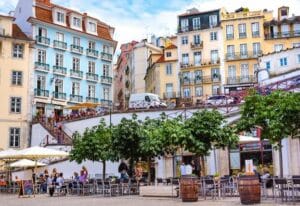
Our Global Intelligence Unit’s Retirement Guide for US Citizens notes that areas like Lisbon and the surrounding Sintra and Cascais are highlighted for their safety and low crime rates. With a safety index of 70.21, walking around the city, even at night, is generally safe, contributing to a sense of security and comfort in daily life.
While it’s always wise to take basic precautions, such as safeguarding personal belongings, Lisbon’s secure environment fully allows you to experience its welcoming atmosphere.
In addition to its safety, Lisbon is recognized as one of the most tolerant cities in Europe. The city embraces diversity, accepting individuals regardless of ethnicity, gender, religion, sexual orientation, or social status.
The 9 Best Neighborhoods in Lisbon
There is no more rewarding experience than exploring the vibrant neighborhoods of Lisbon. Each area offers something unique, from historic charm to modern convenience. Here’s a quick look at nine of the best areas in the city:
1. Alfama
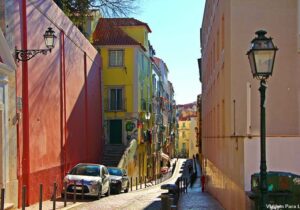
This neighborhood is ideal for those who appreciate the traditional charm not found in other European capital cities and want to experience Lisbon’s rich cultural heritage.
2. Avenida da Liberdade

This bustling area features narrow cobbled streets and is centrally located, offering easy access to major attractions like Praça do Comércio and Elevador de Santa Justa. It’s perfect for those who seek a sophisticated lifestyle in the heart of Lisbon.
3. Bairro Alto
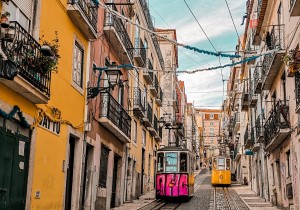
It’s a great place for those who thrive on excitement and social interaction, making it a quintessential part of Lisbon’s nightlife scene.
4. Chiado
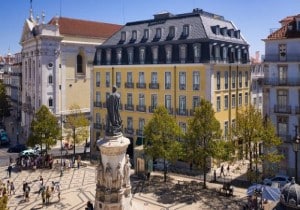
The Baixa-Chiado metro station connects Chiado well, offering easy access to other neighborhoods and attractions like Praça do Comércio and the Elevador de Santa Justa.
5. Alvalade
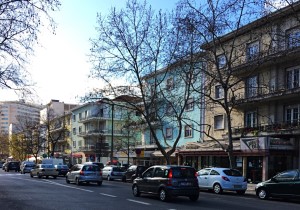
The area boasts tree-lined streets and good public transportation links, making it desirable for families and professionals.
6. Príncipe Real
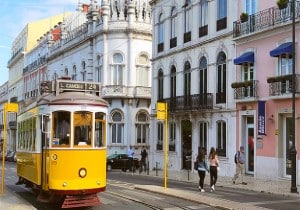
This up-and-coming area is popular with the expat community and those seeking a modern, stylish environment.
7. Avenidas Novas
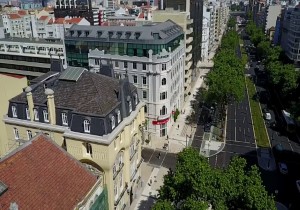
The neighborhood is also home to Parque Eduardo VII, a large park offering stunning city views. It’s a sophisticated area that attracts affluent residents and diplomats.
8. Arroios
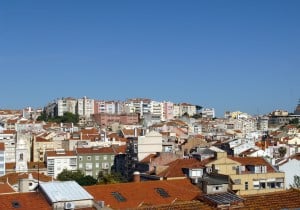
The area benefits from excellent public transport links, making it easy to explore Lisbon. Arroios is perfect for those who enjoy a dynamic and multicultural environment.
9. Estrela

This area features well-preserved 18th and 19th-century architecture and offers a peaceful, upscale residential experience, making it a highly sought-after location in Lisbon.
How to Find Accommodation in Lisbon
For expats with long-term legal residency, Lisbon offers renting or buying property options. Here’s a snapshot of accommodation costs in the city:
Renting in Lisbon
-
The average monthly rent for a one-bedroom apartment (T1) in central Lisbon is around €1,000.
- Outside the city center, a one-bedroom apartment averages approximately €1,200, with slight variations depending on the rental contract.
- Studio apartments typically cost about €900, while two-bedroom apartments start at €1,500. Expect to pay at least €2,000 for three-bedroom apartments.
- Most rental apartments lack central heating, so tenants may need to make provisions during cooler months.
The rental market in Lisbon is quite saturated with expats looking for accommodation, so it’s advisable to find rental apartments immediately after your move to Lisbon is confirmed.
When you arrive in Lisbon, Airbnb and Booking.com are popular options for short-term letting. These platforms offer a wide range of properties for temporary living situations.
Once settled, it’s time to find a more permanent place. Explore Lisbon neighborhoods by using these local resources:
- Idealista
- Spot a Home
- Uniplaces
- Imovirtual
- Facebook groups
Buying property in Lisbon
Foreigners can buy property in Lisbon, and the city has seen an influx of expats interested in investing. Property prices range from €3,000 to €7,000 per square meter, depending on location and condition. Given the competitive market, thorough research and quick action are essential for securing the right investment. Working with a buyer’s agent can help you navigate the property landscape effectively.
Understanding the renting and buying costs and analyzing the cost of living in Lisbon is crucial for expats looking to establish their lives in this vibrant city while managing their overall cost of living.
How to Live in Lisbon as an Expat
For EU Citizens
If you’re an EU citizen, relocating to Lisbon is a smooth process. As part of the European Union, you benefit from the freedom of movement within EU countries. To start your journey, simply register with local authorities to officially reside in Portugal. This ease of movement makes Lisbon a great choice for many expats from the EU looking to make a new home.
For Non-EU Citizens
Portugal offers several immigration options for non-EU citizens looking to make Lisbon their home. The country provides a range of visas tailored to different needs, including Portugal dual citizenship options that are particularly appealing to many expats, such as UK citizens and Americans. Here’s a look at some of the most popular visa categories for non-EU citizens seeking residency in Lisbon:
Portugal Golden Visa Program
The Portugal Golden Visa program offers residency to investors who are contributing to Portugal’s economy. You can qualify by investing in sectors like art and culture or in Portugal Golden Visa investment funds.
D7 Visa Portugal
The Portugal D7 Visa is designed for financially independent individuals, including retirees, who have a passive income and wish to stay in Portugal permanently. To be eligible, you must demonstrate a minimum monthly income of €870, Portugal’s minimum wage. This visa provides an excellent pathway for those with steady passive income.
D3 Visa Portugal
The Portugal D3 Visa, or Highly Qualified Activity Permit, is aimed at skilled professionals who have secured employment or a self-employment contract with a Portuguese company. This visa is ideal for professionals and is designed to attract talent to Portugal’s workforce.
D2 Visa Portugal
The Portugal D2 Visa, also known as the Entrepreneur Visa, is designed for foreigners who wish to start or expand their business in Portugal. It’s suitable for entrepreneurs, freelancers, and independent service providers looking to invest in or launch a business within the country.
Digital Nomad Visa
The Portugal Digital Nomad Visa (D8 Visa) caters to remote working in Portugal. To qualify, you must prove a monthly income of at least €3,480, four times the Portuguese minimum wage. This visa is ideal for digital nomads looking for a base in Lisbon while working remotely.
Understanding each program’s requirements is crucial for a successful relocation regardless of your chosen visa category. Thoroughly researching these options will help you find the best route to making Lisbon your new home.
The Cost of Living in Lisbon
The cost of living in Lisbon is notably lower than in many European capitals such as London, Paris, and Madrid. With Lisbon, compared to other Western European cities, you can comfortably manage around €2,000 per month, covering rent, groceries, and dining out. Lisbon rents are more affordable than other big city locations in Western Europe, making it an attractive choice for those seeking affordable prices and a high quality of life.
Food and dining in Lisbon
Groceries in Lisbon are affordable, offering good value. You can find fresh food at reasonable prices throughout the city. Here are some typical grocery prices in Lisbon:
Food item | Price |
Milk (1 liter) | €0.83 |
Loaf of fresh white bread (125 g) | €0.36 |
White rice (1 kg) | €1.20 |
Eggs (12 units) | €2.20 |
Chicken fillets (150 g) | €1.08 |
Apples (1 kg) | €1.79 |
Bananas (1 kg) | €1.21 |
Tomatoes (1 kg) | €1.99 |
Potatoes (3 kg) | €2.99 |
Onions (1.5 kg) | €2.29 |
Lettuce (700 g) | €0.97 |

- Traditional Portuguese tascas: You can expect to pay between €8 and €12 for a meal, including dishes like “bacalhau à Brás” (salted codfish).
- Coffee or espresso: Costs around €1 to €2.
- Cappuccino: Ranges from €2 to €3.
- Domestic beer: Costs between €1.50 and €4.
Dining at a mid-range restaurant in Lisbon costs approximately €15 to €30 per person, excluding drinks. Upscale dining experiences in Lisbon’s fine-dining restaurants start at €50 or more per person, and expats can opt for local markets for authentic Portuguese cuisine experiences.
Transportation in Lisbon
Transportation in Lisbon is also affordable, and pick-up points are often within walking distance. A monthly transportation pass for the Lisbon metropolitan area costs €40 and includes the metro lines, tram, and bus. A one-way ticket for any of these services costs €1.50.
International Schools in Lisbon
Exploring international schools in Lisbon is essential for families with school-age children. As an international city and a vibrant expats hub, Lisbon has various educational options for the needs of its diverse resident community. While public schools are available for those with legal residency, many families opt for international schools.
International schools in Lisbon offer a range of curricula, including the International Baccalaureate (IB), American, British, French, and German programs, ensuring a well-rounded education that fosters academic excellence and cultural awareness.
Top 5 international schools in Lisbon
- St. Julian’s School (IB British school)
- United Lisbon International School (American and IB)
- Carlucci American International School of Lisbon (American)
- Lycée Français Charles Lepierre (French)
- Deutsche Schule Lissabon (German)
Navigating Public Transport in Lisbon

Metro: The metro is one of the fastest ways to travel across Lisbon. It connects various parts of the city quickly and efficiently, making it ideal for both daily commutes and exploring the city. The metro system is operated by Metropolitano de Lisboa.
Trains: The train system is highly reliable for travel to and from major towns and villages around Lisbon – particularly because connecting areas are just a short train ride away. Trains are punctual and comfortable and offer affordable tickets, ensuring convenient regional connections. Regional and intercity trains are operated by Comboios de Portugal, better known by its abbreviation of simply “CP.”
Tram: Lisbon’s iconic trams offer a charming way to explore the city. They navigate its hilly streets and provide scenic views of historic neighborhoods in this vibrant international city. Companhia Carris de Ferro de Lisboa operates the tram system.
Buses: Buses provide a flexible mode of transport within the city, reaching areas not covered by the metro. They are a practical option for getting around Lisbon and exploring neighborhoods and are operated by Carris Transportes Públicos Lisboa.
Taxis: Taxi rides in Lisbon are inexpensive compared to other European cities. Not all vehicles will have the signature green “TAXI” sign on the roof, but rather a TVDE sign on the windshield and the back window. These are registered taxis, and the TVDE sign designates companies that provide individual and paying passengers with transport services through platforms like Uber, Bolt, or Cabify.
For frequent use of public transport, consider the Viva Lisboa Card. This card can be topped up with credit or passes and offers a cost-effective way to travel around Lisbon. Additionally, TAP Portugal provides options for air travel if you’re looking to explore further destinations.
Opening a Bank Account in Lisbon
Opening a Portuguese bank account is easy. First, you need a NIF (your tax identification number in Portugal), proof of identity, proof of address, and a minimum deposit of €250 to €300.
The Portuguese banking system, regulated by the Central Bank of Portugal, includes over 150 banks, ensuring high EU standards. The Multibanco system connects around 12,000 ATMs for easy withdrawals, bill payments, and more.
Here are the steps to open a bank account in Portugal:
- Choose a local branch of your preferred bank.
- Gather required documents: ID, proof of address, NIF Portugal number, and proof of income.
- Visit the branch to request a new account.
- Select the type of account (savings or current).
- Follow the bank representative’s instructions, which may require an immediate deposit.
Some banks, like ActivoBank and Novo Banco, allow non-residents with an NIF to open online accounts, typically requiring a video call for verification.
Healthcare in Lisbon
Portugal provides a reliable public health service that is generally affordable for residents. While certain treatments may not be covered by Portugal’s national health service, a non EU citizen can access the country’s public health service. Additionally, private health insurance is an option, typically costing between €400 and €1,000 per year, depending on coverage and medical needs.
Private hospitals offer enhanced services and flexibility for those seeking more immediate or specialized care. When planning your coverage through the Portugal healthcare system, it’s important to evaluate your health needs, consider both public and private hospitals, and gauge your private health insurance requirements.
Taxes in Lisbon
If you live in the capital city or anywhere else in Portugal for over 183 days a year, you’ll be classified as a tax resident. To comply, you must register as a taxpayer and obtain your NIF at your local tax office.
Income tax rates for residents range from 14.5% to 48%, while non-residents face a flat rate of 25% on income earned in Portugal. Additionally, property owners must pay local taxes, such as IMI (Imposto Municipal Sobre Imóveis), which varies by municipality.
Previously, Portugal offered a Non-Habitual Residency (NHR) tax scheme, providing foreign residents tax benefits. However, the NHR no longer accepts new applications and will be replaced by the new NHR scheme called the Tax Incentive for Scientific Research and Innovation.
Learning The Portuguese Language
You’ll find numerous opportunities to learn Portuguese, as Lisbon offers a vibrant atmosphere where you can practice your skills daily. Many language schools and exchange programs cater to various levels, so you can easily start learning Portuguese.
While Portuguese is essential, you’ll be relieved that English is widely spoken, especially among younger generations and in tourist areas. This makes it easier for English-speaking expats and foreign residents to navigate the city as they acclimate to their new surroundings and effectively interact with Portuguese people.
To help you get started, here are some useful Portuguese phrases:
- Obrigado (if the speaker is male)/Obrigada (if the speaker is female) – Thank you
- Bom dia – Good morning
- Tudo bem? – How are you?
- Até já – See you later
The Pros and Cons of living in Lisbon
While there are certainly pros and cons to living in Portugal, here’s a clear breakdown of the advantages and disadvantages to help you weigh your options when contemplating moving to Lisbon.
Advantages
- Affordable cost of living compared to other major European cities.
- Enjoy endless sunshine and mild, pleasant winters, unlike much of Western Europe.
- Close to the Atlantic coastline and the stunning Tagus River.
- Affordable properties for rent or purchase.
- High quality of life with a blend of nature and city life.
- Growing job opportunities and a thriving startup scene.
Cons
- Many homes lack central heating.
- Portuguese salaries are lower compared to some Western European countries.
- Lisbon rents can be high in desirable areas, making it difficult for Portuguese nationals to afford to live in their own city.
- Navigating bureaucratic processes in the Portuguese capital can be time-consuming and complex.
Things To Do in Lisbon
Visit the beautiful beaches

For a change of scenery, cross the river to Caparica or take a short taxi ride to Ericeira, known for its excellent surfing conditions. Another notable spot include Praia de Santo Amaro. Living in Lisbon allows you to explore these gorgeous beaches during the good weather months and pick your favorite spot for sun and sea.
Enjoy the vibrant nightlife

If you’re in the mood for dancing and craft cocktails, Pensão Amor and Lux are great choices. Don’t miss the annual Lisbon carnival, a spirited street party that fills the narrow streets with energy for two weeks.
This festival is a highlight for those living in this vibrant city.
Explore the arts and culture

Explore vibrant street art in neighborhoods like Alfama and Graça. Lisbon also offers fantastic shopping with a mix of international designer stores and local fashion.
Experiments with local cuisine
Portuguese cuisine is renowned worldwide, and Lisbon delivers various delicious, affordable options. Try local favorites like pastel de nata (custard tarts), bola de Berlim (custard-filled doughnuts), and pastel de bacalhau (codfish cakes).
Street corners across Lisbon are perfect for sampling these iconic treats. Additionally, coffee enthusiasts will appreciate the city’s thriving cafe culture and enjoy its charming cafes.
Why choose Global Citizen Solutions for your Immigration Visa?
GLOBAL APPROACH BY LOCAL EXPERTS
- GCS has offices located across Portugal.
- Members of the US-Portugal and UK-Portugal Chambers of Commerce in Portugal, and the Investment Migration Council (IMC).
- Our expert team can help you throughout your journey to secure your Visa.
100% APPROVAL RATE
- Our successful track record in applications provides reassurance to applicants.
- We have helped clients from more than 35 countries secure residency in Portugal.
ALL-ENCOMPASSING SOLUTION
- With a single channel of communication, our approach ensures that you have complete clarity on your application.
- Our BeGlobal® Onboarding System allows for a total flow of information.
TRANSPARENCY AND PRIVACY
- Our pricing is clear and detailed, you will not face any hidden costs.
- All data is stored within a GDPR-compliant database on a secure SSL-encrypted server.
Frequently Asked Questions about Living in Lisbon
What is living in Lisbon like?
Lisbon attracts many expats due to its excellent climate and around 9 to 10 months of fantastic weather each year. This city is large enough to offer diverse experiences yet small enough to provide a sense of peace and proximity to the coastline and Tagus River for enjoyable waterfront walks.
Is it expensive to live in Lisbon?
From groceries eating out, to utility bills and rent, living in Lisbon is pretty affordable. In fact, as a single person, you can comfortably get by with around €1,200 per month. Not to mention, if you have a bit more to spare and an itch to travel, you’re in a great location to access cheap flights to other European countries.
Where should I live in Lisbon?
The most popular neighborhoods to live in Lisbon include Alfama, Graca, Anjos, Estrela, Principe Real, Baixa, Avenida, and Campo de Ourique. You’ll find rental apartments, Airbnb, hotels, and investment properties in all the major villages.
What are the pros and cons of living in Lisbon?
Living in Lisbon has a range of advantages, including its temperate climate, rich cultural scene, captivating architectural heritage, delectable cuisine, and warm and welcoming locals. However, there are cons, such as expensive rents and limited employment opportunities.
Can you live in Lisbon with only English?
While it is possible to live in Lisbon with only English, the language isn’t as widely spoken and it’s advisable to learn at least some basic Portuguese to help with everyday communication and to make your daily life more convenient.
Which neighborhoods are the most up-and-coming in Lisbon?
In Lisbon, expatriates often invest in property in popular areas such as Misericórdia, Santa Maria Maior, and Santo António. However, alternative neighborhoods like Anjos, Intendente, and Lapa are emerging as hotspots for investors due to increasing popularity from renovation efforts.
Can a foreigner buy a property in Portugal?
If you’re considering living in Lisbon, you might want to consider buying a property. Not only is the Lisbon real estate market flourishing, but it also offers a potential return on your investment, thanks to its booming tourist industry.
Which Portuguese cities have similarities with American cities?
For Americans, Lisbon is similar to San Francisco with its hills and waterfront. Porto has a lively feel like New Orleans, while Braga echoes Austin’s youthful vibe, making these cities great for expats.
Is Lisbon expat-friendly?
Lisbon is often considered an expat-friendly city for several reasons. It has a growing expatriate community, and many locals are proficient in English, which simplifies communication for newcomers. The city provides an affordable cost of living compared to other European capitals, along with a high quality of life, a pleasant climate, and a rich cultural scene.
How effective is public transportation in Lisbon, and what modes are available?
Lisbon’s public transportation system is an efficient and cost-effective way to wander the famed seven hills, historic districts, and riverside areas. The primary modes of public transport include buses, trams, the metro, trains, ferries, and iconic funiculars.
Is Lisbon an inclusive city for foreigners?
Apart from being safe, Lisbon is quite liberal and welcoming to foreigners. People are accepted in the city of Lisbon despite their gender, religion, ethnicity, sexual orientation, or social status. Whether you are an immigrant or a local, you will find your own space in the city.
What makes Lisbon a great place for shopping and education?
Lisbon, the dynamic capital, blends history with modernity and it is a shopper’s paradise, with its outdoor markets and handcraft items. It offers a diverse range of educational institutions, international schools, and enriching extracurricular activities for children.

 Gizane Campos
Gizane Campos  The average monthly rent for a one-bedroom apartment (T1) in central Lisbon is around €1,000.
The average monthly rent for a one-bedroom apartment (T1) in central Lisbon is around €1,000.
 Yes, it’s possible to find a job as an expat in Lisbon. Foreign citizens can find attractive employment opportunities in various industries, such as:
Yes, it’s possible to find a job as an expat in Lisbon. Foreign citizens can find attractive employment opportunities in various industries, such as:


